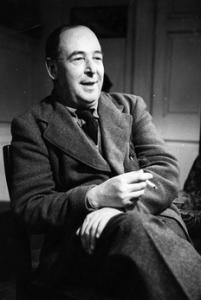C. S. Lewis: Saint or Sinner?
As usual, I will first let you know why I am able competently to speak/write about this subject (viz., C. S. Lewis). Of course, I never met him. He died on November 22, 1963 when I was 11 years old and in the sixth grade. Why do I remember that so well? Because he died on the same day that President John Kennedy was assassinated. It’s an essay date to remember. (Do I remember where I was when I heard of Kennedy’s assassination? Yes, I was walking back to school from home where I had gone for lunch. A fellow student told me and I didn’t believe him. Then we spent the rest of the afternoon in school watching the news on television.)
I read many of Lewis’s books when I was in high school and college and have continued reading and studying them ever since. I actually started with Mere Christianity and went from there to his apologetic books, his fantasy books, his science fiction books, and his essays. During my doctoral studies at Rice University I taught an undergraduate course on Lewis during which I read several biographies and learned that his least favorite of his own books was The Screwtape Letters and that his favorite of his books was Til We Have Faces.
Later, as senior editor of Christian Scholar’s Review, I edited a special edition of the journal about Lewis and fell into the middle of a controversy about The Dark Tower, Lewis’s last and never completed novel. I had to reject a scholarly article by a Lewis scholar arguing that Lewis did not write it but that it was written by a man who then curated Lewis’s papers. That controversy blew up into a major row and we, the editorial board, did not think the article proved its claims.
I recently watched an episode of one of my favorite British detective dramas that included many references to Lewis. It drove me nuts. The program partly filmed inside pub where Lewis and the other “Inklings” met (The Eagle and the Child that some of the characters referred to as The Bird and the Baby). A major prop for the program was a huge sword they allied “The Sword of Truth” that Lewis allegedly swung around during his lectures at Oxford. The only book of Lewis’s mentioned in the program was The Lion, the Witch, and the Wardrobe and some mentions were made of characters, especially Peter.
But worst of all, the show ended with one of the characters, an Oxford detective, telling his colleague a story about what Lewis allegedly said to Tolkien when Tolkien told him about his newest fantasy book. According to the character, who is supposed to have studied theology at Oxford before becoming a policeman, Lewis responded to Tolkien “Not more ‘friggin’ elves!” Then the policemen says to his college “Only he didn’t say ‘friggin’.”
Really? I seriously doubt it.
Then I began to read essays online about various biographies of Lewis, some of which I have not read. One essay speculated about whether Lewis and Joy Davidman ever consummated their marriage. Who cares? There seems to be something of a war of words among Lewis scholars about his private and personal life. And the authenticity of his Christianity. One biographer speculated that he would have joined the Catholic Church except for something. (I don’t recall the “something” but probably the papacy.) The implication was that Lewis was an Anglocatholic. I doubt it.
Why the fuss about Lewis’s personal life and whether he wrote The Dark Tower or not? I mean people get really riled up about these things. The debate about The Dark Tower almost came to court in a potential law suit.
It seems to me there are two sides about Lewis and not much in between. Scholars who write about Lewis (and others who make TV shows and films about him) either lean toward treating him as a saint (that’s called “hagiography”) or toward treating him as a sinner pretending to be a saint.
Instead of just enjoying Lewis’s amazing literary works, scholars tend to get caught up in controversial and unprovable details about his personal life. Some claim he was actually homosexual. People dive deeply into his troubled relationships with his father and brother. Other get caught up in his friendships (or not) with Tolkien and Barfield. The fact is that, in many cases, there is simply no way to know the details.
The simple fact is that Lewis was both a “saint” (not in the official Orthodox or Catholic sense but in the sense of a devout Christian who offered his life to the Kingdom of God) AND a sinner—like all of us. I am not interested in the sordid details of his personal life, if any. At least so far, members of the #MeToo movement (and others) have not accused him of sexually harassing or assaulting students or anyone else. That’s a relief. But was he homosexual in the sense of attracted to members of his own sex? Who cares? I don’t. Did he and Joy Davidman consummate their marriage? I don’t care. But did he wave a physical “Sword of Truth” around during his lectures or throw an obscenity at Tolkien? I do care because he didn’t and I really detest it when television show writers make up “false facts” about my heroes that sully their reputations. Did they even ask any Lewis scholars about these claims? I can only say I doubt it. But they should have. And they should have left them out of the story. It’s almost as if they wanted to sully his reputation among viewers who would believe these falsehoods as true facts.
*If you choose to comment, be sure to keep it relatively brief (no more than 100 words), on topic, addressed to me, civil and respectful (not hostile or argumentative) and devoid of pictures or links.*














